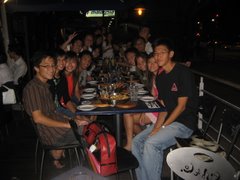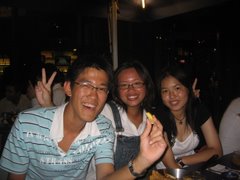The Reporters Without Borders organization was formed in 1985 and has been fighting for press freedom on a daily basis. Basically they do take care of each region (ie. Asia Pacific, the Americas, Africa etc) by compiling reports of press freedom violations. Their researchers then send protest letters to pressurize the target government who do not respect the right to inform and be informed. It also send releases to the media to gather support for such journalists under attack.
World Press Freedom Day is on May 3.
An offending word or photo may result in the journalist himself being persecuted. Hence RWB defends the persecuted and also exposes their mistreatment/torture in certain countries.
Also, RWB fights against censorship.
"198 journalists and media assistants killed since the start of fighting in Iraq in March 2003, two still missing, 14 are kidnapped"
...
"Two journalists under sentence of death now on 42nd day of hunger strikes" - Iran, yesterday
...
"With 11 journalist currently detained, Iran continues to be the Middle East’s biggest prison for the press and is one of the world’s 10 most repressive countries as regards freedom of the media." -RWB
...
The regime in Libya (a one-party state) controls the media and there are no independent press outlets. The press is simply a propaganda tool in Libya, under the rule of the “Brother Leader,” Muammar Gaddafi. Said one journalist: “In Libya, you can criticise Allah but not Gaddafi." However, times are changing, and now they have public internet access points. Hence Libyans may finally be out of the dark.
"Government gets blog service providers to sign "self-discipline" pact to end anonymous blogging" - China, two days ago
This pact was signed by at least 20 leading blog service providers in China including Yahoo.cn and MSN.cn. This marks the end to anonymous blogging in China. Upon signing to this pact, blog service providers are “encouraged” to register users under their real names and contact information before letting them post blogs. More seriously, they will be required to keep this information, which will allow the authorities to identify them. These companies have already in the past provided the police with information about their clients, resulting in arrests.
"The pact says “blog providers should monitor and manage comments ... and delete illegal and bad information in a timely manner.” Articles 11 and 12 urge them to equip themselves with a secure management system that allows them to keep bloggers’ details, including their real name, address, contact number and email address.
ISC secretary-general Huang Chengqing was clear yesterday when he said: “Blog service providers who allow the use of pseudonyms may be more attractive to bloggers, but they will be punished by the government if they fail to screen illegal information.”
Let's turn our direction to something more relevant to us:
"Singapore near bottom of press freedom index" -April 2004
Reporters Sans Frontieres recently published their 3rd Press Freedom Index, which ranked 167 countries for the degree of press freedom in them. Not surprisingly, Singapore ranked low, at position 147, i.e. 88% down from the top.
The only countries ranking lower than Singapore are dictatorships such as Burma and Pakistan, or communist countries such as Vietnam and China. Indeed, Singapore is also a one-party state, and all the main newspapers and broadcast stations are either government-owned or government-controlled.
"An adviser to former Prime Minister Lee Kuan Yew reprimanded Today editor Mano Sabnani in November for allowing a report to be published about a trip by Lee's wife to London for medical reasons. The young journalist who wrote the story, Val Chua, reportedly had her press card suspended."
"More famously, various foreign media have been bullied not to write searching articles about Singapore. Some, such as the Far Eastern Economic Review, have had their circulation curtailed. Others, such as the International Herald Tribune and the Economist, have either been sued in court for libel or threatened with such suits. In a recent case, the Economist was alleged to have libeled the Lee family when it said having the wife of the Prime Minister as head of the holding company that owned most government-linked businesses, suggested nepotism. The Economist chose to apologise and settle rather than fight the case in court. No one has yet won such cases against government figures in Singapore. "
Tag!
Saturday, August 25, 2007
Subscribe to:
Post Comments (Atom)




No comments:
Post a Comment